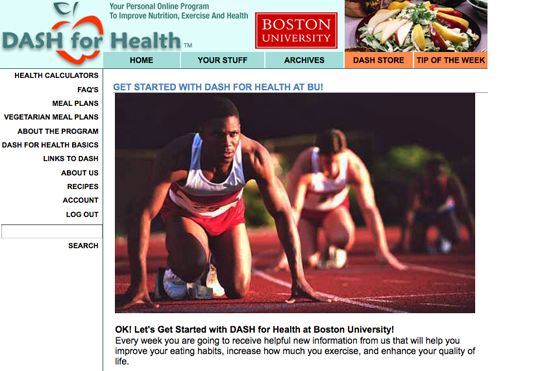DASH to Health
Online support for eating better and getting in shape

New Year’s is long gone, and with it scores of well-intentioned resolutions. The January gym crowds have dissipated, vending machine stockers are working overtime, and Captain Crunch has replaced morning crunches.
“Now is the time for folks to get out of their postresolution slumps,” says Megan Murphy, program manager of DASH for Health, a free online program designed to improve eating and exercise habits.
Created by a team of BU doctors and nutritionists led by Thomas Moore, a School of Medicine professor of medicine and a Medical Campus associate provost, the DASH program offers well-balanced, easy-to-understand eating plans intended to lower weight, blood pressure, and cholesterol.
“It differs from other online diet programs because it doesn’t promise a quick fix,” Murphy says. “It’s about teaching good eating habits that will last a lifetime, not fitting into a bikini by Memorial Day.”
Based on the DASH diet, developed in 1992 by a team of researchers from five academic institutions and promoted by the National Heart, Lung, and Blood Institute to control hypertension, the DASH program’s curriculum offers twice-weekly articles about nutrition, food preparation, dining out, losing weight, and getting fit.
DASH is open to BU faculty and staff and up to three adult household members. After enrolling, participants monitor progress by logging onto their “My Stuff” page, which tracks weight, diet, blood pressure, and daily exercise routines. The section also creates weekly meal suggestions and recipes (including vegetarian options), offering a servings tutorial and a shopping-list creator.
“Poor dietary habits have resulted in serious health concerns for millions of Americans,” Moore says, “including obesity, diabetes, and cardiovascular disease. We focus so heavily on caloric reduction and weight loss that we tend to ignore the health benefits that are provided by well-balanced diets.”
In 2002, the DASH program was offered as a free benefit to employees of EMC Corporation, an information infrastructure company based in Hopkinton, Mass.
According to an article published in 2008 by the Journal of Medical Internet Research, 2,834 EMC employees and spouses enrolled and provided information about their food intake. Moore and his team used the data to analyze changes in weight, blood pressure, and food intake.
“After two years, participants who remained enrolled were eating significantly more fruits and vegetables and fewer grain products,” Moore says. “They also reduced their consumption of carbonated beverages, reduced their weight, and lowered their blood pressure.”
Enrollees who visited the DASH Web site regularly also tended to have greater success in lowering blood pressure and losing weight. “These statistics suggest that DASH was at least partially responsible,” Moore says, “so we strongly encourage members of the BU community to enroll.”
BU staff and faculty members and up to three adult household members can enroll in DASH for Health for free. Participation is confidential. Informational sessions for the Charles River Campus are offered today, Thursday, February 25, at 808 Commonwealth Ave., Room 134, from 2:30 to 3:30 p.m., and tomorrow, Friday, February 26, at the College of Arts & Sciences, 725 Commonwealth Ave., Room 216, from 11:30 a.m. to 12:30 p.m.
Vicky Waltz can be reached at vwaltz@bu.edu; follow her on Twitter at @vickywaltz.
Comments & Discussion
Boston University moderates comments to facilitate an informed, substantive, civil conversation. Abusive, profane, self-promotional, misleading, incoherent or off-topic comments will be rejected. Moderators are staffed during regular business hours (EST) and can only accept comments written in English. Statistics or facts must include a citation or a link to the citation.